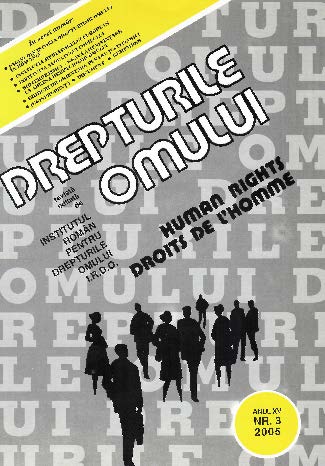Despre instituția Mediatorului european
On the European Mediator institution
Author(s): Robert MustațăSubject(s): Public Administration, EU-Legislation
Published by: Institutul Român pentru Drepturile Omului
Keywords: European Mediator institution; European citizens; European Union; Code of Good Administrative Conduct;
Summary/Abstract: While initially the Constitutive Treaties of the European Communities did not attach increased importance to human rights issues, which was accounted for by the fact that the emphasis was laid upon the economic relationships among States, once a unique market had been instituted, based on four fundamental freedoms, the protection of the fundamental rights came to be not only a desideratum but also a certainty. At present, at the level of the European Union, the Charter of the Fundamental Rights, inspired from the values of the European Convention for the Protection of Human Rights and Fundamental Freedoms and those of the Universal Declaration of Human Rights, is a solid basis for the protection of the fundamental rights and freedoms. It is no accident that European Union Member States are among the States that ratified, in time, the European Convention adopted by the Council of Europe. The European Mediator institution has emerged not only as a mediating actor, but also as an institution that implicitly provides, by means of its investigations and reports, the defence and the observance of European citizens' fundamental rights. We believe the European Mediator to have contributed to both the elaboration of the European Constitution and the adoption of important communitarian documents meant to protect the rights, the freedoms and the legitimate interests of the European citizens, a self-speaking example being the Code of Good Administrative Conduct, elaborated as a result of the Mediator's efforts among other things. Rejection through referendum of the European Constitution by the citizens of France as well as those of Holland is a drawback with the ratifying process, whose timing coincided with the negotiations regarding approval of the Union's budget. Beyond all speculations, which we would like to avoid, the rejection through referendum of the Constitution reflects a clear message conveyed by the European citizens: the Union should profoundly reform its mechanisms, act in consonance with the principle of transparency and truly become a Europe of the citizens, an area of freedom, security and justice. To others, this moment is only a delay, a reason for starting over the negotiations and re-thinking the priorities. The drawback the ratifying process is facing does not mean the end of a project and so much the less does it mean the end of the idea of European unification, gradually developed in several decades and with remarkable efforts, often accompanied by concessions made by the European States.
Journal: Drepturile omului
- Issue Year: 2005
- Issue No: 3
- Page Range: 20-23
- Page Count: 4
- Language: Romanian

